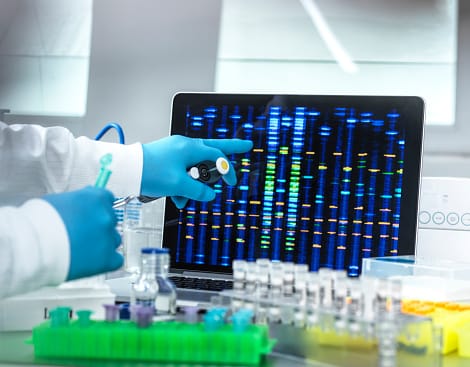Introduction
One of the most important genes involved in drug metabolism is CYP2D6. CYP2D6 is one of the genes associated with Cytochrome P450 (CYP) system.
The Cytochrome P450 system is a group of enzymes responsible for metabolizing a wide range of substances in the human body. The CYP system is essential in the metabolism of medicines, toxins, and endogenous compounds; including hormones, fatty acids, and cholesterol. This system is crucial for eliminating toxins such as pesticides and carcinogens from the body, ensuring the detoxification process necessary to keep our bodies healthy. In addition, the Cytochrome P450 system helps to break down waste products making them easier for our bodies to eliminate.
The cytochrome P450 (CYP) activity varies among different drugs. However, drugs that exhibit CYP activity can fall into three categories: inhibitors, inducers, or substrates. Inhibitor drugs can reduce the activity of CYP enzymes, potentially resulting in increased drug concentrations and a higher risk of drug toxicity. Inducer drugs can enhance the activity of CYP enzymes, leading to accelerated drug metabolism and decreased drug concentrations. This reduction in drug levels can compromise the effectiveness of medications, resulting in the medication not working as expected. Substrates are chemicals directly affected by the enzyme. Therefore, understanding the CYP activity of drugs is crucial to avoid potential drug toxicity or diminished therapeutic outcomes.
The CYP2D6 enzyme, found mostly in the liver and brain, is responsible for the metabolism of commonly prescribed drugs such as antidepressants, antipsychotics, beta-blockers, opioids, and antiarrhythmic medications. Your psychiatric or your cardiovascular medication may not work as expected because of your personal CYP2D6 enzyme activity.
What does CYP2D6 do in the body?
CYP2D6 is responsible for breaking chemicals into smaller, less active molecules that are more easily eliminated from the body. However, genetic variations in the CYP2D6 gene can affect the activity of the enzyme, leading to differences in drug metabolism and potentially impacting a person's response to these medications. The CYP2D6 gene is distinct in that a person can have multiple copies (up to 13 copies have been found in some individuals). Those who are known as ultrarapid metabolizers may have several functioning copies of the CYP2D6 gene leading to multiple copies of the active enzyme leading to reduced efficacy. Alternatively, poor metabolizers may have inactive enzymes leading to insufficient metabolism of CYP2D6 substrates leading to increased toxicity.
Variations in the CYP2D6 gene affect its activity. Individuals who have more active versions of the gene experience faster drug metabolism with reduced benefit of certain medications. Others may have fewer active versions of the gene, leading to slower drug metabolism and potentially increasing the risk of side effects.
Certain medications affect CYP2D6 enzyme activity by inhibiting its function. Statins, for example, can alter how an alternate medication functions. In this case, taking a properly prescribed statin may lead to the toxicity of a completely different medication. Each prescriber needs to know all other medicines, drugs, or herbals you take to help avoid this kind of medication error.
What medications are metabolized by CYP2D6?
CYP2D6 is an important enzyme in the liver that plays a significant role in the metabolism of many medications.
Examples of medications metabolized by CYP2D6:
- Antiarrhythmics (medications that help the heart beat regularly):
- flecainide
- propafenone
2. Anticancer:
- gefitinib – used as a treatment of non-small cell lung cancer.
- tamoxifen, a selective estrogen receptor modulator used in the treatment of breast cancer.
3. Antidepressants:
- amitriptyline
- bupropion
- citalopram
- desipramine
- duloxetine
- fluoxetine
- imipramine
- nortriptyline
- paroxetine
- sertraline
- venlafaxine
4. Antipsychotics:
- aripiprazole
- chlorpromazine
- clozapine
- haloperidol
- perphenazine
- risperidone
5. Beta blockers (medications that help with heart rhythm and with blood pressure):
- carvedilol
- metoprolol
- propranolol
- timolol
- yohimbine
6. Opioids:
- codeine
- hydrocodone
- morphine
- oxycodone
- tramadol
7. Other:
- atomoxetine – used for ADHD treatment.
- dextromethorphan – over the counter cough medication
- tolterodine – helps with bladder control.
- diphenhydramine – antihistamine for allergies
- promethazine – antihistamine used for nausea/vomiting and allergies.
It is important to note that CYP2D6 is highly polymorphic, meaning that variations in the gene can lead to diverse levels of enzyme activity, which can affect the metabolism of medications that are substrates for CYP2D6. Individuals who are poor metabolizers have an increased risk of toxicity of medications or may take medications with poorer efficacy. Individuals who are ultra-rapid metabolizers may have decreased efficacy or increased toxicity.
Pharmacogenetics Testing: CYP2D6
Pharmacogenetics is the study of how genetic variations may affect a person's response to drugs. Pharmacogenetics testing can help identify these genetic variations and inform treatment decisions. By analyzing an individual's DNA, pharmacogenetic testing can provide information about their CYP2D6 status as well as other genes that affect efficacy of medications. Knowing your results can help your prescriber choose a potentially more effective and less toxic medication.
For example, individuals with more active versions of the CYP2D6 gene may require higher doses of certain medications to achieve the desired therapeutic effect. On the other hand, individuals with less active versions of the gene may require lower doses to avoid side effects or toxicity. Alternatively, your prescriber may choose to use a medication unaffected by the CYP2D6 enzyme.
Pharmacogenetic testing may help identify individuals who may be at increased risk of adverse drug reactions. CYP2D6 metabolizes multiple antidepressants and antipsychotics. Individuals with less active versions of the gene may be at increased risk of side effects such as drowsiness, dizziness, and tremors. Those who have less enzyme activity may better be suited to avoid medicines relying solely on CYP2D6 activity.
Alternative treatment options may be better determined once pharmacogenetic testing has been completed.
Conclusion
In summary, the CYP2D6 gene plays a critical role in drug metabolism and can impact a person's response to up to 25% of commonly prescribed medications. ClarityX® testing can help identify genetic variations in the CYP2D6 gene, helping to optimize treatment for the individual. Precision medicine improves therapeutic outcomes and reduces the risk of adverse drug reactions while reducing trial and error, saving time, and saving money.
Resources:
- Clinical Pharmacogenetics Implementation Consortium. CYP2D6 genotype and use of tamoxifen in breast cancer: guidance from the Clinical Pharmacogenetics Implementation Consortium. Clin Pharmacol Ther. 2018;103(5):770-777.
- Crews KR, Gaedigk A, Dunnenberger HM, et al. Clinical pharmacogenetics implementation consortium guidelines for cytochrome P450 2D6 genotype and codeine therapy: 2014 update. Clin Pharmacol Ther. 2014;95(4):376-382.
- Hicks JK, Sangkuhl K, Swen JJ, et al. Clinical Pharmacogenetics Implementation Consortium guideline (CPIC) for CYP2D6 and CYP2C19 genotypes and dosing of selective serotonin reuptake inhibitors. Clin Pharmacol Ther. 2015;98(2):127-134.
- Hicks JK, Swen JJ, Thorn CF, et al. Clinical Pharmacogenetics Implementation Consortium guideline (CPIC) for CYP2D6 and CYP2C19 genotypes and dosing of tricyclic antidepressants: 2016 update. Clin Pharmacol Ther. 2017;102(1):37-44. doi:10.1002/cpt.597
- https://www.ncbi.nlm.nih.gov/pmc/articles/PMC4093435/
- https://www.pharmgkb.org/vip/PA166170264
- Stingl JC, Brockmöller J, Viviani R. Genetic variability of drug-metabolizing enzymes: the dual impact on psychiatric therapy and regulation of brain function. Mol Psychiatry. 2013;18(3):273-287. doi:10.1038/mp.2012.24





